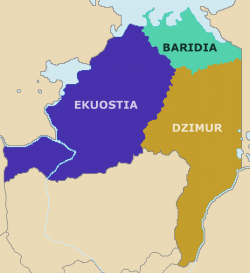Ekuostia
Ekuostia
Ekuostolsát | |
|---|---|
 A map displaying the three subregions of Barradiwa; Ekuostia is the west region marked in dark blue-purple. | |
| Capital | Rydkes |
| Largest city | Sonegío |
| Languages | Ekuostian, Dzimraic |
| Population | |
| • Total | 81,470,506 |
| Demonym(s) | Ekuostian |
Ekuostia (Ekuostian: Ekuostolsát /ekwʌst̪ʌls̪ɑ:d̪/) is one of the three grand duchies (or states) of Barradiwa, located chiefly in the country's western half. With a population of approximately 75.4 million people, Ekuostia is the most populous of the three Barradiwan grand duchies. Its seat of government is based in Rydkes, although the region also contains Barradiwa's national capital and overall largest city, Sonegio.
Ekuostia, particularly regions concentrated around Lake Khuda and the Khuda and Ekuos rivers, is one of the oldest continually inhabited regions in the world, and part of it was part of the Ekuos-Khuda confluence cradle of civilization; historians often refer to the area around Terydnunekuos in ancient times as "South Halaria". As the name suggests, the region is also the primary region in which the Ekuostian language is spoken widely.
Etymology
History
Geography
Demographics
As of 2019, the official population of Ekuostia was 75,470,506. Of these, approximately 4 million did not hold Barradiwan citizenship, accounting for approximately 4.8% of the population.
The city of Sonegio includes 14,638,315 people and covers an area of 2,670 km2 (1,030 sq mi), while its metropolitan area covers an estimated 18-20 million people. It is the largest city both in the Ekuosian Union and in Baredina in terms of population.
Languages
In the 2019 census, 61,135,926 people (75% of the population) declared Ekuostian as their sole native language, with 63,731,244 people (78.2%) recording that it as the language they spoke most frequently at home. The second most widely spoken language is Dzimraic, spoken natively by 9,839,825 people (12.1%), with 9,104,842 (11.2%) speaking it most frequently at home.
